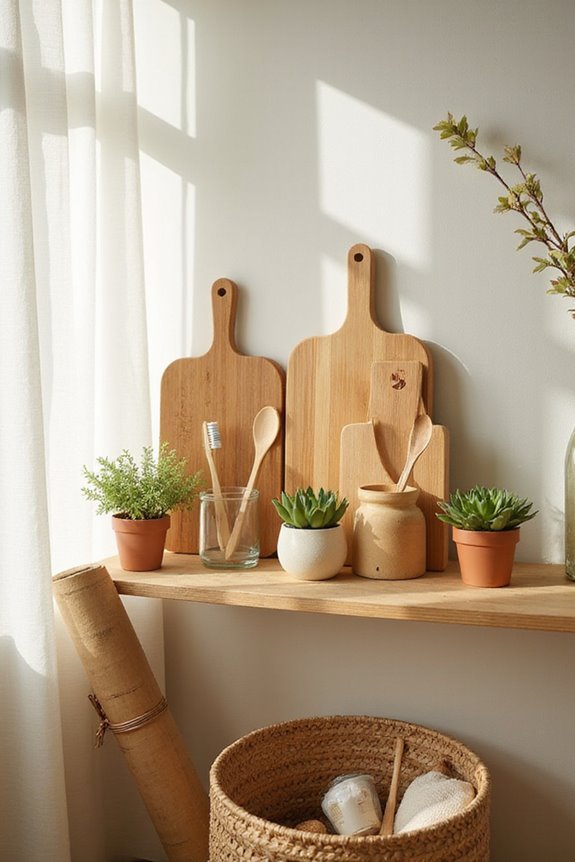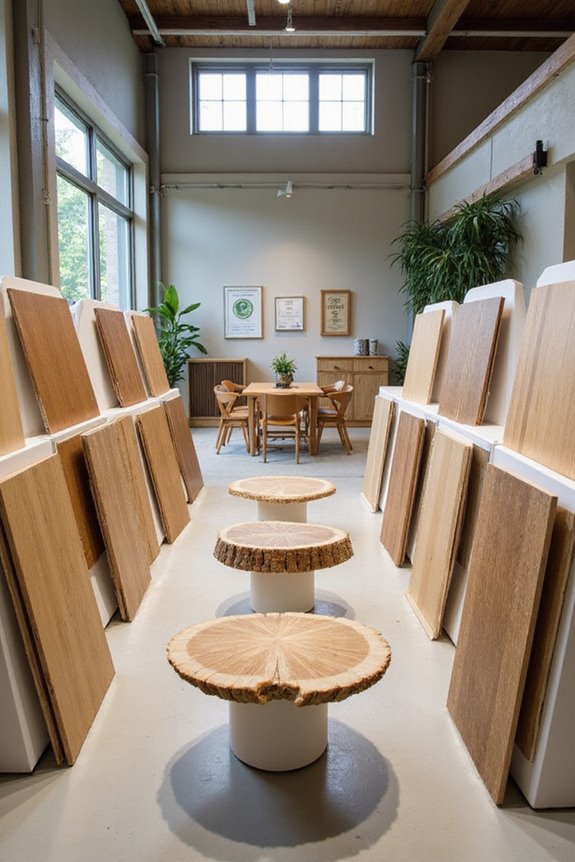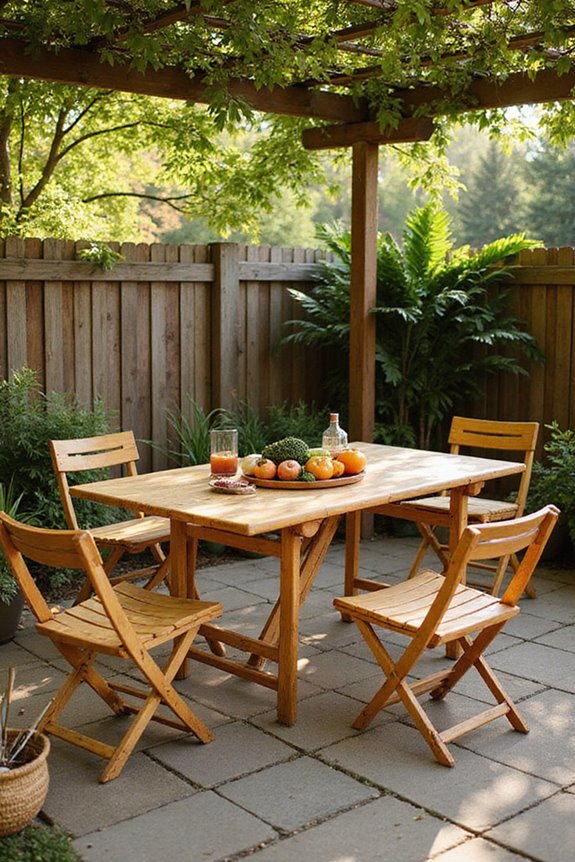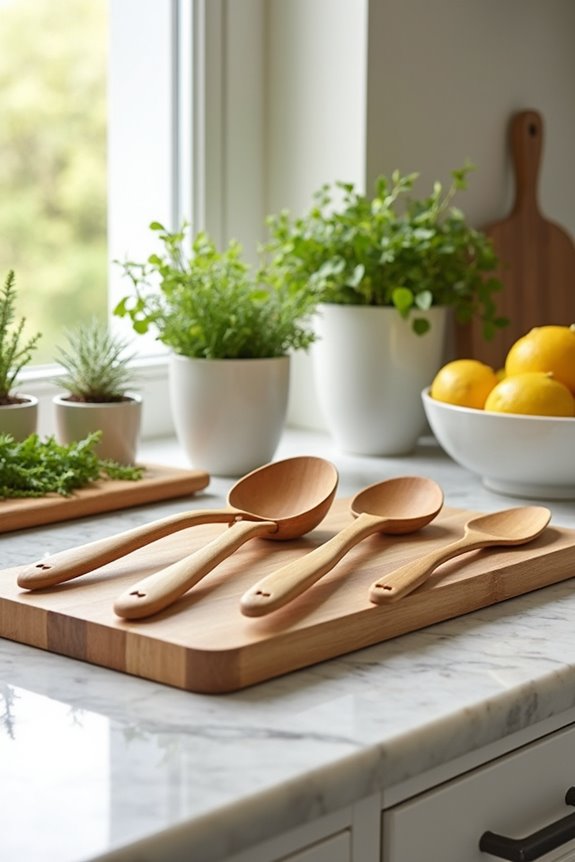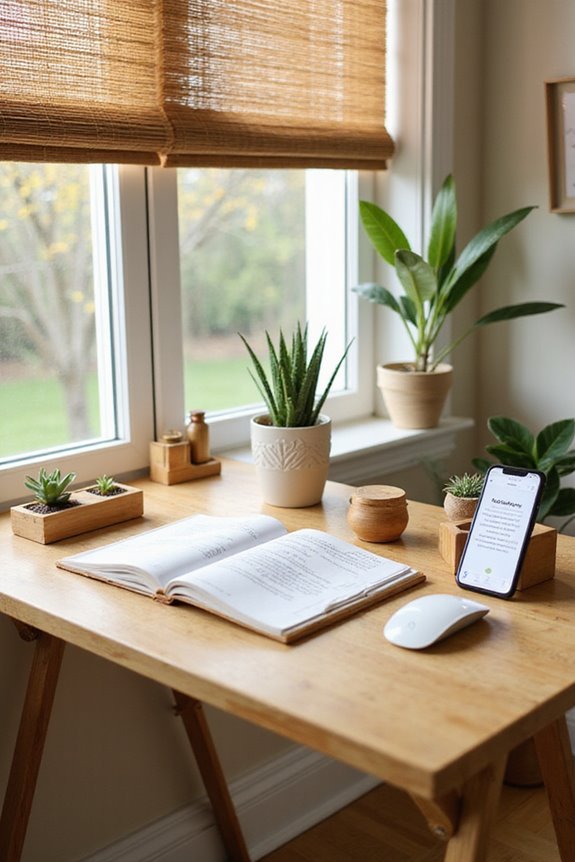We can find certified organic bamboo products from various sources. First, manufacturers like Greene Textile and Wazoodle produce high-quality bamboo goods. Next, eco-friendly retailers and boutiques curate a range of bamboo items, including kitchenware and clothing. Online marketplaces like Amazon and Etsy also offer certified organic options, ensuring sustainability with eco-friendly certifications. By exploring these channels, we can make informed choices and discover even more about the benefits of bamboo products.
Key Takeaways
- Eco-friendly retailers and natural product boutiques offer a curated selection of certified organic bamboo products like kitchenware and clothing.
- Online marketplaces such as Amazon and Etsy feature a wide range of bamboo items, emphasizing eco-friendly certifications.
- Health and wellness shops stock bamboo bedding and hypoallergenic clothing, promoting sustainable living.
- Dedicated wholesalers provide global distribution of certified organic bamboo products for various markets.
- Hospitality suppliers offer certified bamboo dinnerware, catering to restaurants focusing on sustainability.
Certified Organic Bamboo Manufacturers
When we look for certified organic bamboo manufacturers, we find several key players in North America. These companies are committed to sustainability and quality. For example, Greene Textile, located in California, is known for its high-quality bamboo fabrics and eco-friendly processes. Similarly, Wazoodle and Simplifi focus on sustainable practices, using solar energy and chemical-free production. Additionally, many of these manufacturers implement eco-friendly practices that highlight the renewable nature of bamboo.
- Sourcing Strategies: Companies like Nick of Time Textiles prioritize local sourcing, ensuring freshness and reducing environmental impact.
- Market Trends: The popularity of bamboo products is rising, aligning with growing consumer demand for sustainable textiles.
Retail and Wholesale Channels for Bamboo Products
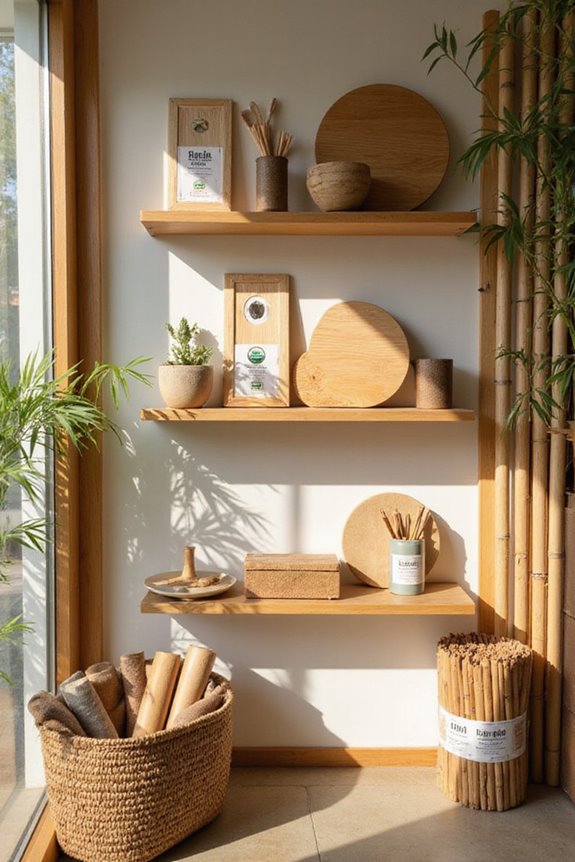
As we explore the retail and wholesale channels for bamboo products, it’s clear that these markets are thriving alongside the growth of sustainable consumerism.
- Retail Channels
- Specialty eco-friendly retailers focus on curated bamboo goods like kitchenware and personal care items.
- Natural product boutiques often stock certified organic bamboo, promoting toxin-free options.
- Health and wellness shops include bamboo bedding and clothing for their hypoallergenic benefits.
- Farmer’s markets feature local vendors offering small-scale sustainable bamboo goods.
- Dedicated wholesalers supply a range of bamboo items globally, supporting sustainable sourcing.
- Zero waste product wholesalers distribute kitchenware and utensils, catering to eco-friendly retailers.
- Hospitality suppliers provide certified bamboo dinnerware for restaurants focusing on sustainability.
- Many of these channels emphasize the importance of sustainably sourced materials, ensuring that bamboo products are both eco-friendly and durable.
Online Marketplaces for Organic Bamboo Goods
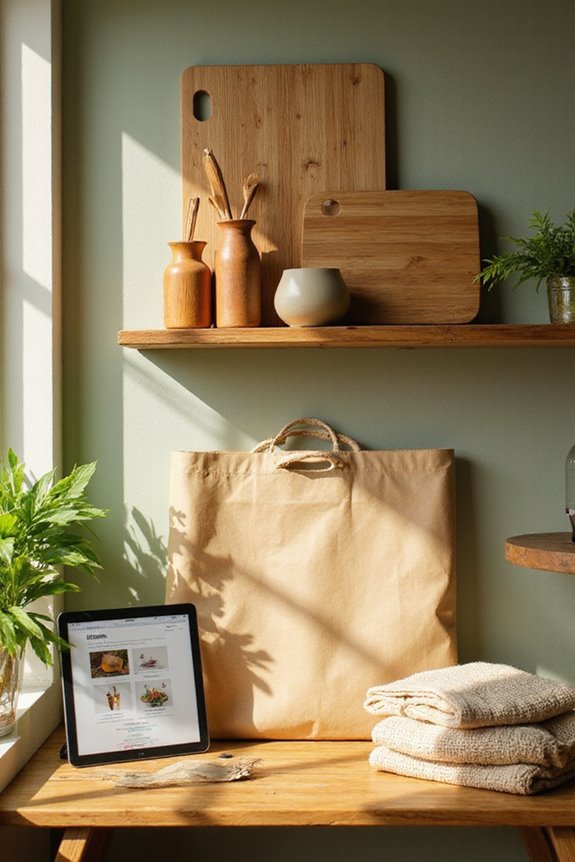
Online marketplaces for organic bamboo goods have become essential for shoppers seeking sustainable products. We can explore various platforms like Amazon and Etsy, where multiple sellers offer a wide range of bamboo items, from kitchenware to personal care products. Many of these retailers emphasize eco-friendly certifications and sustainable packaging, ensuring that our choices align with our values.
For instance, Oceans Republic focuses on eco-friendly kitchenware, while ZellJoy provides products like bamboo straws and hair brushes. Customer reviews on these platforms help us make informed decisions about quality. Plus, we can often enjoy perks like free shipping and multiple payment options, making our shopping experience even smoother. Together, we can support a greener planet through informed purchasing. Additionally, many bamboo products, such as toilet paper, are biodegradable and compostable, further reducing our environmental impact.
Certifications and Standards for Bamboo Products
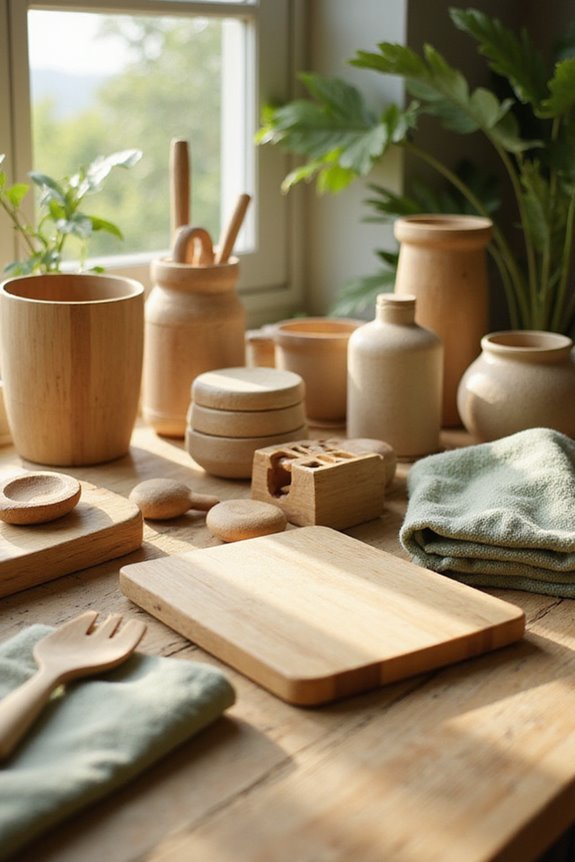
Certifications and standards play an essential role in guaranteeing the quality and sustainability of bamboo products. Understanding the certification processes helps us choose items that align with our values. For example, the USDA National Organic Program certifies bamboo grown without chemicals for at least three years.
- Global Organic Textile Standard (GOTS): Guarantees textiles have at least 70% organic fibers.
- Ecocert Organic Certification: Focuses on sustainable sourcing and environmental responsibility.
- Forest Stewardship Council (FSC): Ensures bamboo comes from responsibly managed forests.
These certifications enforce strict sustainability metrics, guaranteeing we support products that are not only durable but also environmentally friendly. By choosing certified bamboo products, we contribute to a more sustainable future together. Additionally, many bamboo products, such as bamboo toilet papers, are made from 100% biodegradable materials, enhancing their eco-friendliness.
Geographic Sources of Certified Organic Bamboo
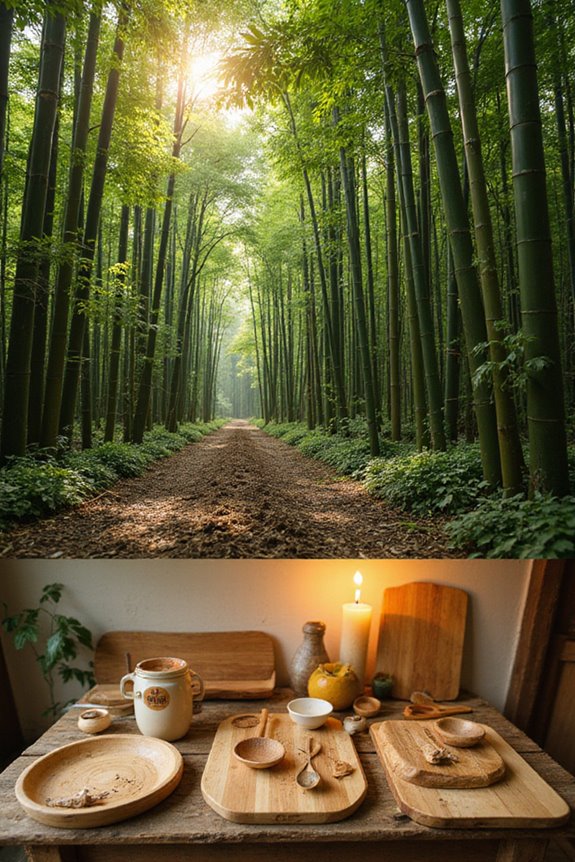
Geographic sources play a significant role in the availability and quality of certified organic bamboo products. Most bamboo cultivation occurs in China, particularly in provinces like Fujian, Jiangxi, and Zhejiang. These regions are known for producing Moso bamboo, the most commonly cultivated species.
- Fujian Province: Renowned for high-quality bamboo and tea, many organic products come from here.
- Jiangxi Province: This area boasts significant bamboo plantations, contributing to overall supply.
- Zhejiang Province: Another key player in bamboo cultivation.
Beyond China, Southeast Asian countries like Indonesia and Vietnam also contribute, though on a smaller scale. Together, these regions highlight the importance of bamboo sustainability practices, promoting eco-friendly practices while ensuring a reliable supply of organic bamboo products.
Types of Organic Bamboo Products Available
When we think about organic bamboo products, a wide variety comes to mind, each offering unique benefits. For instance, we can explore bamboo utensil varieties, including 100% organic bamboo utensils, compostable options, and even reusable bamboo straws. These alternatives not only replace plastic but also support eco-friendly living.
We also have great bamboo bedding options to evaluate. Bamboo lyocell sheets are soft and breathable, while organic bamboo pillows provide comfort and sustainability. Additionally, bamboo duvet covers and mattress protectors enhance our sleeping environment with eco-friendliness. Bamboo products are known for their natural antibacterial properties, making them a healthier choice for your home.
Together, these organic bamboo products help us create a more sustainable lifestyle. By choosing these items, we embrace both comfort and responsibility in our homes.
Benefits of Purchasing Certified Organic Bamboo Products
Purchasing certified organic bamboo products offers numerous benefits that align with our commitment to sustainability and health. First, they provide significant health advantages. Bamboo’s natural antibacterial properties help keep our textiles fresh and hygienic. Plus, its hypoallergenic fibers are perfect for sensitive skin.
Second, we can feel good about the environmental impact. Bamboo is a rapidly renewable resource that requires less water and no harmful pesticides. This means healthier soil and ecosystems. Additionally, certified organic bamboo is grown without synthetic chemicals, reducing our exposure to toxins.
Lastly, bamboo products are biodegradable, ensuring they won’t harm the planet when disposed of. By choosing certified organic bamboo, we support a healthier lifestyle and a more sustainable future for everyone.
Frequently Asked Questions
Are There Any Eco-Friendly Packaging Options for Bamboo Products?
We can explore various eco-friendly packaging materials for bamboo products together, focusing on sustainable sourcing. Using biodegradable options like cornstarch, recycled paper, and reusable bags helps us make a positive impact on our environment.
What Is the Expected Lifespan of Bamboo Products?
When we consider bamboo durability, we find that its lifespan varies widely. With proper care, bamboo products can last from a few years to over a decade, depending on their type and usage environment. Let’s cherish them!
Can Bamboo Products Be Recycled or Composted?
We can definitely recycle and compost bamboo products! With proper sorting and attention to adhesives, bamboo decomposition happens quickly, enriching our soil while reducing waste. Let’s embrace bamboo recycling for a sustainable future together!
How Do I Properly Care for Bamboo Textiles?
As we nurture our bamboo treasures, let’s embrace bamboo maintenance tips and washing guidelines. We’ll wash gently, avoid harsh chemicals, and air dry, ensuring our textiles remain soft and vibrant, just like our shared experiences.
Are There Any Allergy Concerns With Bamboo Products?
We recognize bamboo allergies and sensitivities can be concerning. Choosing certified organic bamboo products minimizes risks, as they’re free from harsh chemicals. Let’s prioritize safety and enjoy the comfort bamboo offers together!

